30 Must-See Strange Things Found on Google Maps
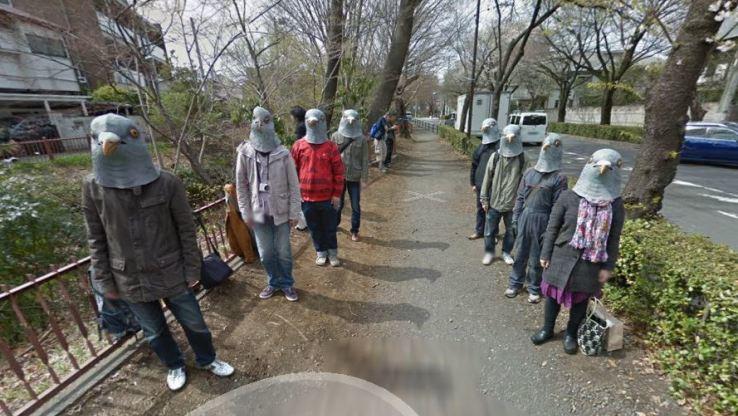
With satellites and planes photographing us from above — and with camera-equipped cars taking panoramic photos of almost every road in the world — Google seems determined to record all aspects of our lives. And then post those detailed images online. Anyone with internet access can now see some of the most mysterious objects, fascinating animals and strangest people in the world. Check out this incredible selection of unusual images captured on Google Earth, Google Maps and Google Street View.
These Divers Seem Pretty Fishy
Clearly, these snorkelers were never told that water is an integral part of the diving experience. Thanks to their photo taken by Google Maps in Bergen, Norway, these two guys have gained acclaim for sitting on the side of the road decked out in snorkeling gear.
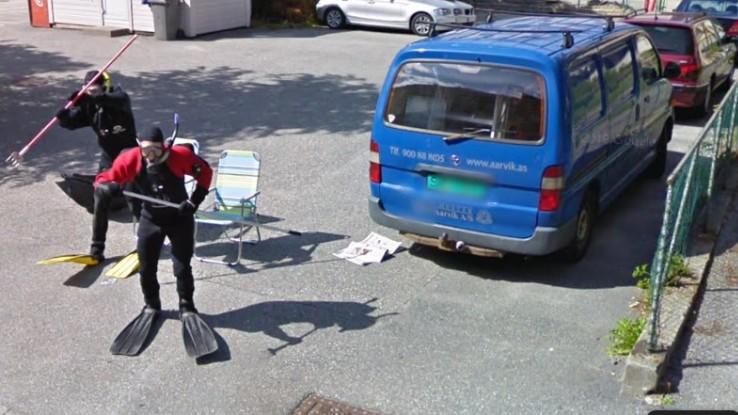
The two pranksters are Bergen residents Borre Erstad and Paul Age Olsen. After being tipped off that the Google Maps car would be driving by, the two men dressed up and waited. The silly snorkelers’ photos went viral, with the duo striking several poses, reading magazines and playing in the road with pitchforks.
Passionate Pandas
These playful pandas aren’t at a park. These images come from the Chengdu Research Base of Giant Panda Breeding, a facility designed to spark panda passion. These adorable images were captured on Google Maps when it collected shots of Sichuan, China, and they show the pandas looking happy and playful.

Clearly the Chengdu center’s efforts to increase the panda population are working. The facility opened in 1987 with six rescued pandas but had facilitated 124 panda births by 2008. The center is also a popular tourist destination where visitors can see the cute creatures at their most romantic.
Not Very Neighborly
Perhaps the person who wrote “AHOLE” with an arrow had never heard of the saying “Good fences make good neighbors.” The owner of this Sequim, Washington, land and their neighbors appear to have unresolved issues.
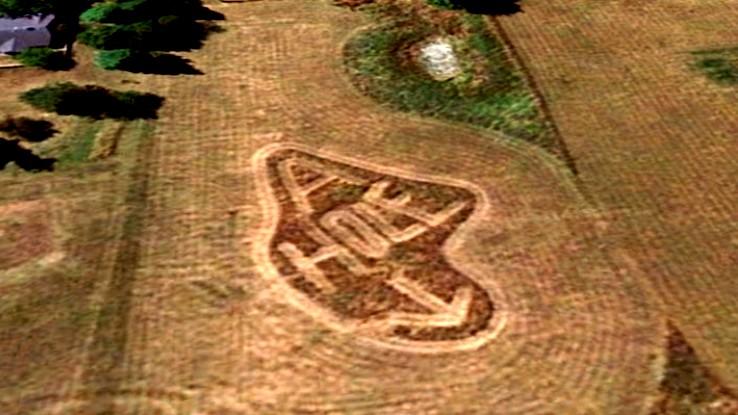
The mowed message was created when Blaine and Cindy Zechenelly decided to paint their garage and an adjoining apartment purple. Neighbors saw red and insisted the purple property was an eyesore, even signing a petition asking for their property taxes to be lowered. While the angry neighbor clearly wasn’t amused by the color selection, Google Earth users got a kick out of the feud.
An Atomic Attraction
This giant atom might look like some kind of futuristic structure, but it’s actually the Atomium, a Brussels, Belgium, landmark built in 1958 for the Brussels World Expo to honor progress in the sciences. The atom was the symbol selected to represent scientific achievements.
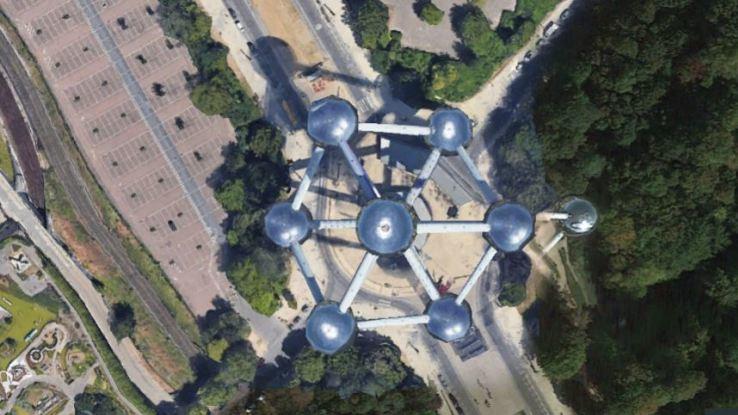
The building was not supposed to stay up after the World Expo but was kept due to its popularity. It’s constructed from stainless steel and is 335 feet tall. Tubes connect the building’s five spheres. The Atomium is now a museum filled with exhibit halls, public spaces and a restaurant.
Not the Nazi Navy
It looks like a building that should be in Nazi Germany, but it’s actually part of the U.S. Naval Amphibious Base in Coronado, California. Known as Naval Amphibious Base Complex 320-325, the building’s original 1967 concept was very simple and did not take on a swastika shape until modifications were made to the design.
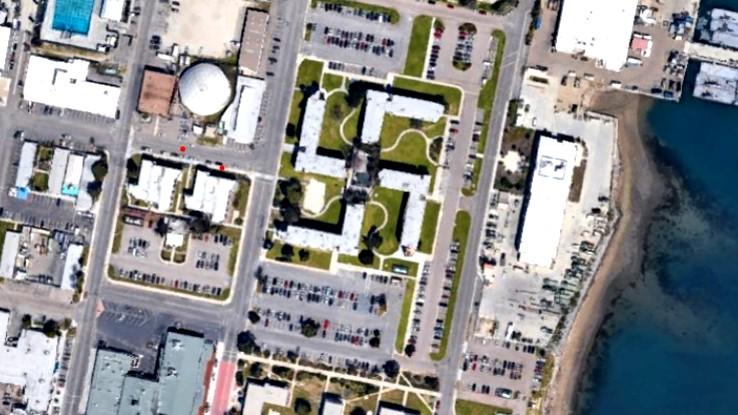
The building’s original architect said he merely thought of the complex as being four L-shaped buildings. Although the Navy announced plans to spend $600,000 to modify the building back in 2007, the swastika design still appears on Google Earth.
A Sealife Spectacle
In 2009, one fishy crop circle popped up in Oxfordshire, England. Someone had transformed a barley field into a 600-foot jellyfish crop circle. Crop circle expert Karen Alexander told The Telegraph it was the first jellyfish crop circle she knew of and was three times larger than traditional versions of these phenomena.
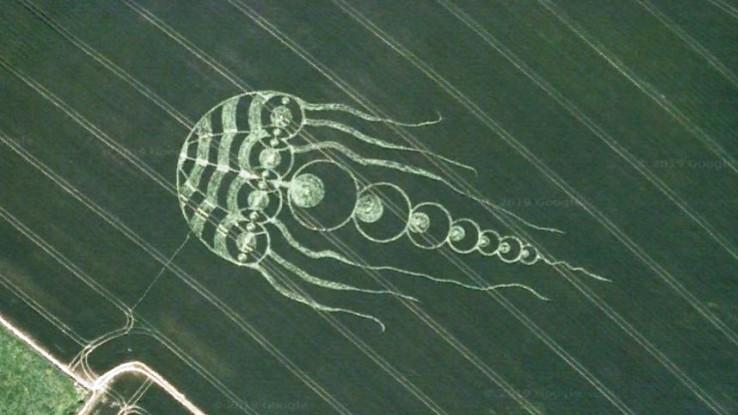
In addition to creating a unique piece of art, some crop experts theorized that the ginormous jellyfish was created to predict a solar storm and that its tentacles and body parts represented Earth’s magnetosphere. Other crop circle analysts claimed it symbolized human energy fields known as chakras.
An Enigmatic Equine
Located in Oxfordshire, England, the Uffington White Horse is a mystery. The 3,000-year-old prehistoric hill figure dates back to the Bronze Age, is 374 feet long and was created from deep trenches filled with crushed white chalk. Re-filling the design with chalk, or “re-chalking,” has been a local tradition for hundreds of years.
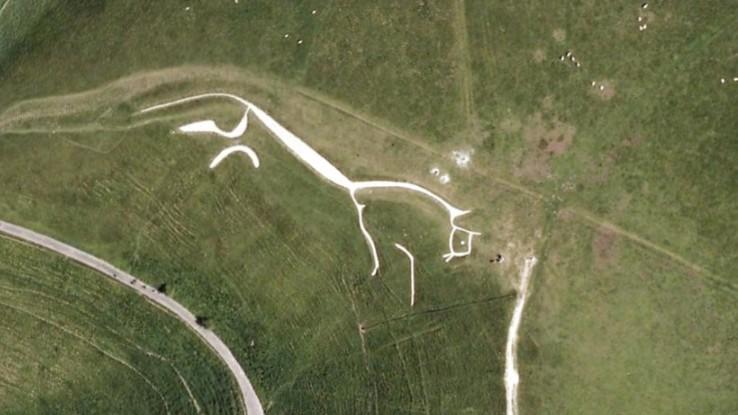
The Uffington White Horse is a favorite among fans of the paranormal, who note the unusually high number of crop circles found near the image. Whatever this abstract equine really represents, the fluidity and movement in its design are undeniably beautiful.
These Dolls Honor the Dead
In Shikoku, Japan, the village of Miyoshi has had a decline in population. Its remote location makes it an unappealing choice for younger people in the workforce, and the town’s residents are slowly dying off. Seeing that the area where she once lived was nearly deserted, Ayano Tsukimi decided to honor its dead.
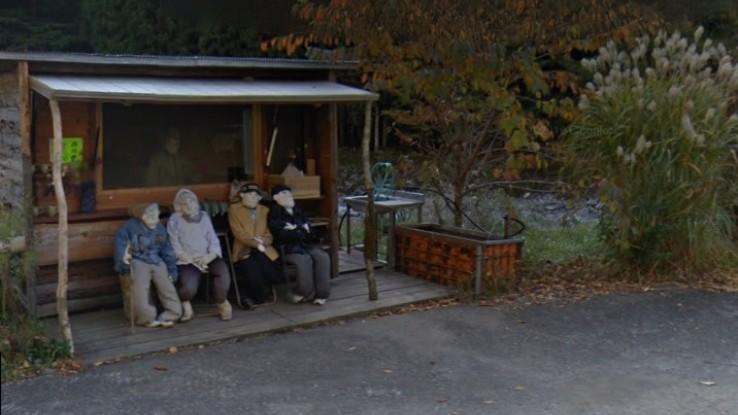
By 2014, Tsukimi had created 350 life-sized dolls, each representing a villager who had died. While the dolls are found in several of the village’s stores, homes and schools, Tsukimi has placed many near the roadside to encourage visitors to pay homage to the dearly departed.
Horsing Around
Who’s the man wearing the horse head? Photos of someone horsing around can be seen on Google Street View — probably not just in this spot, either. This picture was snapped in the Hardgate neighborhood in Aberdeen, Scotland, where people refer to a mystery man in a sweater and dark trousers as “Horse Boy.”
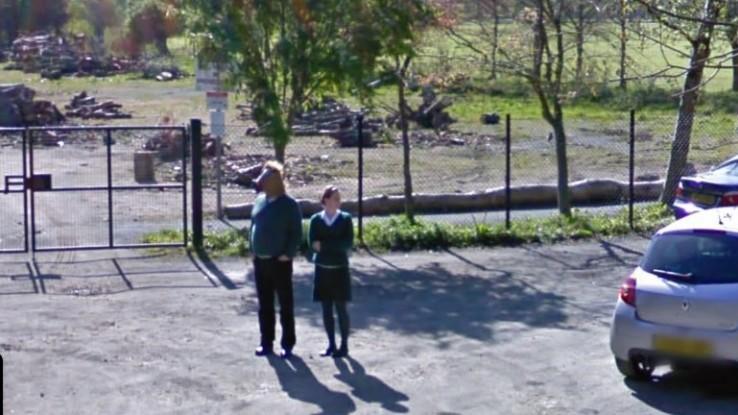
Dozens of people have gone online to boast that they know Horse Boy’s true identity, and dozens more are claiming to be Horse Boy. In 2010, a story about Horse Boy generated more than a million hits. According to fans, this one-trick pony has appeared in several different Google Street View snapshots.
A Fish out of Water
The Headington Shark was commissioned in 1986 by local radio presenter Bill Heine. The 25-foot shark is made from fiberglass and took sculptor John Buckley three months to construct. The Oxford City Council criticized the sculpture, saying the planning commission hadn’t approved it.
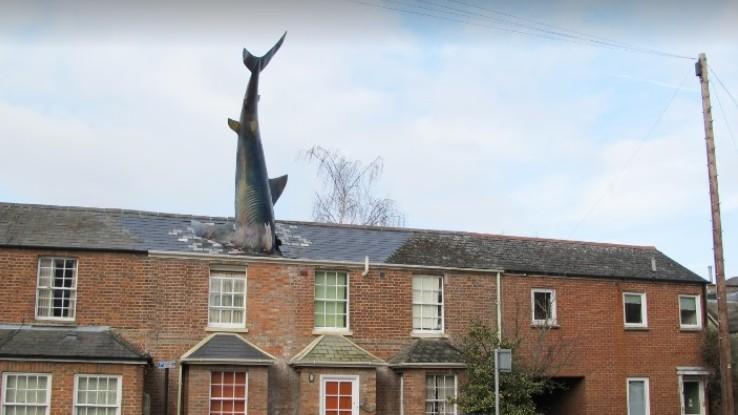
An offer by the city council to move the sculpture to the local swimming pool was declined. In 1992, the Department of the Environment ruled that the shark could remain at the house. The house was purchased by Heine’s son in 2016 and is currently run as an Airbnb.
Shipwrecked
It looks like Google Earth spotted the Primrose, a 16,000-ton freighter that ran aground near North Sentinel Island after it encountered a storm on August 2, 1981. The ship was transporting chicken feed from Bangladesh to Australia when it sank in the Bay of Bengal.
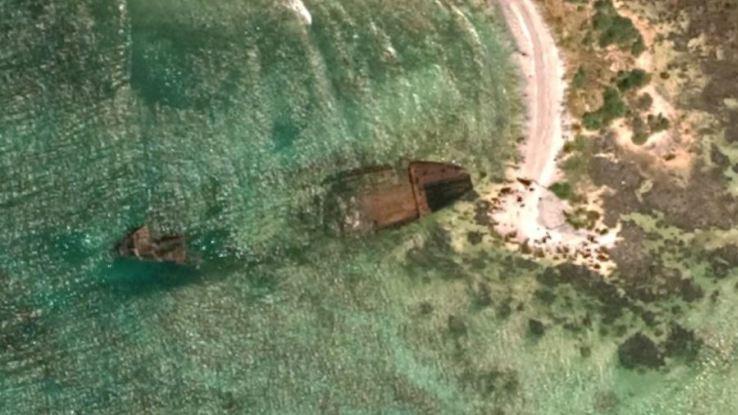
But the story took a more frightening twist. An unwelcoming island tribe that kills strangers began approaching the ship. Approximately 50 men from the tribe began making wooden boats and were preparing to attack the Primrose with spears and knives. The crew was eventually rescued by a helicopter that winched them to safety.
Prankster Pigeons
Google Street View just happened to catch images of these peculiar pigeons walking down the road. The freaky flock was actually just a group of students from nearby Musashino Art University enlisted by the Japanese blog, Daily Portal Z, to pull off a prank.
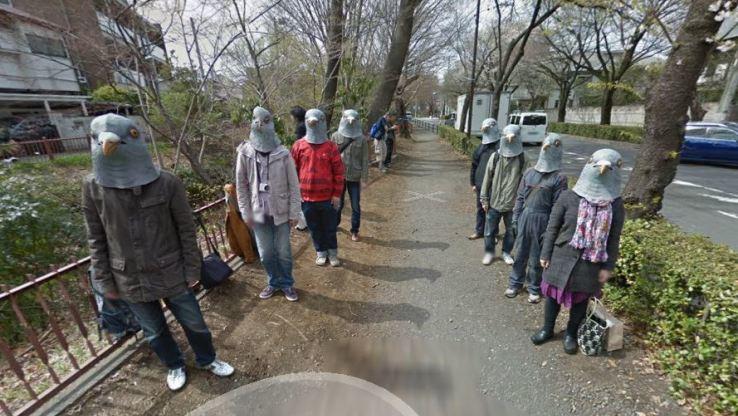
Students were asked to dress up as birds and walk down the street just as the car drove by. The photos of the students have since gone viral, and the group has been nicknamed the “Japanese Pigeon People.” It just goes to show that birds of a feather do flock together.
Wayne’s World
Party on, Wayne and Garth! It looks like the wacky Wayne’s World duo decided to take a stroll down the street. Far from their homes in Aurora, Illinois, the two were spotted in Plymouth, England. Google Street View captured them sporting their iconic 1980s mullets and carrying drumsticks and a guitar.

The fictional friends were beloved characters from a recurring Saturday Night Live sketch that was turned into a wildly popular 1992 movie. So were the two characters portrayed by Dana Carvey and Mike Myers truly in England? As Wayne and Garth would say, “No Way! WAY!”
A Not-So-Jolly Giant
Google Earth has caught captivating images of the Cerne Abbas Giant. Located in the village of Cerne Abbas near Dorset, England, the fearsome naked giant is 185 feet long and wields a large club. The white chalk image stands out against the surrounding lush greenery.
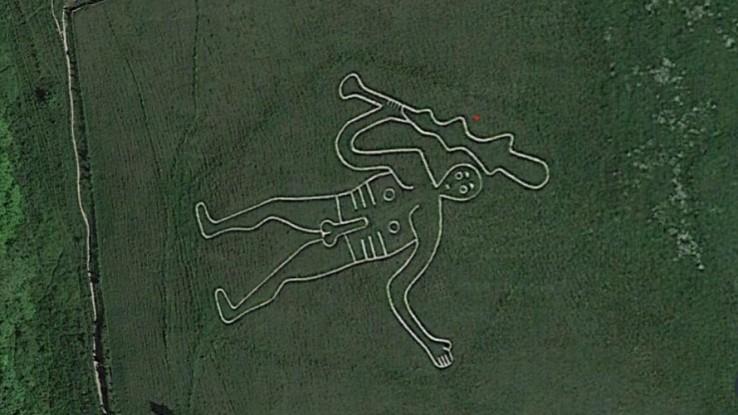
The age of the Cerne Abbas Giant is unknown. Some historians believe it represents an ancient Saxon deity or Hercules, while other scholars believe it could be a fertility symbol. The figure is a scheduled monument overseen by England’s National Trust and is also a popular British attraction.
This Island’s a Fiery Fake
Anyone who checks out images of Antarctica’s Deception Island is certain to be deceived. What appears to be an island when viewed from above on Google Earth is actually the top of an active volcano. For many years, the “island” was utilized for commercial whaling and also served as a research station.
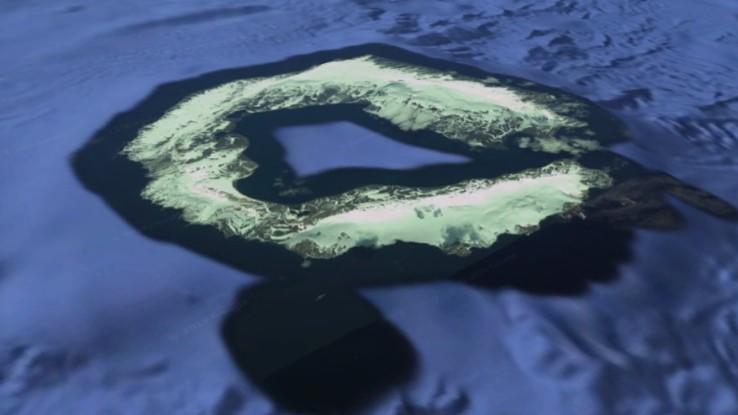
Commercial and research activities stopped when it was decided that working on an active volcano was too risky. During the 1960s, the volcano erupted twice in two years, demolishing buildings and leaving everything under piles of ash. Today, Deception Island is a popular tourist attraction.
Making a Run for It
If you happen to be reading this in prison and are contemplating an escape, don’t plan your getaway when a Google Maps car is driving down the street. It seems that’s what Google’s cameras may have picked up while filming in Gauteng, South Africa.
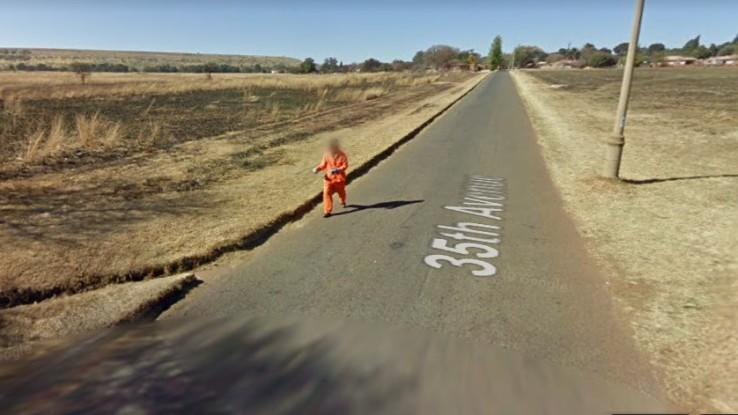
This photo was taken in 2010 and shows a man in an orange jumpsuit running down a deserted road with a large, empty field on one side and houses off in the distance. While the man has never been identified, it certainly looks as though this guy is on the lam.
A Bicycle Built for Two
Plenty of Google Street View fans were left scratching their heads after seeing this photo of a woman on a penny-farthing (large-wheeled bicycle) riding down the street with a penguin stuffed animal in tow. But locals from Cottesloe, Australia, were able to clear up the confusion.
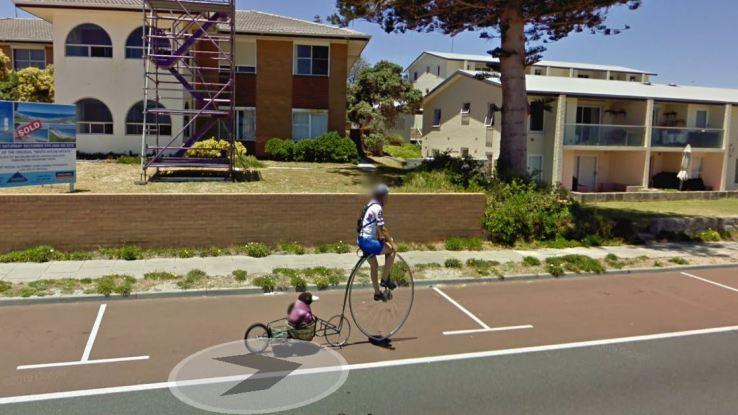
According to sources, the cyclist is champion penny-farthing rider, Nicky Armstrong. Armstrong tows her toy penguin, named “Peng,” behind her to help stabilize her bike. Towing something also stops her from flipping if she has to come to a sudden stop. When she’s not out riding with Peng, the medal-winning cyclist practices law.
This Home Seems Pretty Plane
No, this plane didn’t crash in the forest. It’s a decommissioned Boeing 727 passenger jet that’s been converted into a home. Although it’s hidden by trees on a 10-acre property, this Hillsboro, Oregon, house is one you can spot on Google Earth.
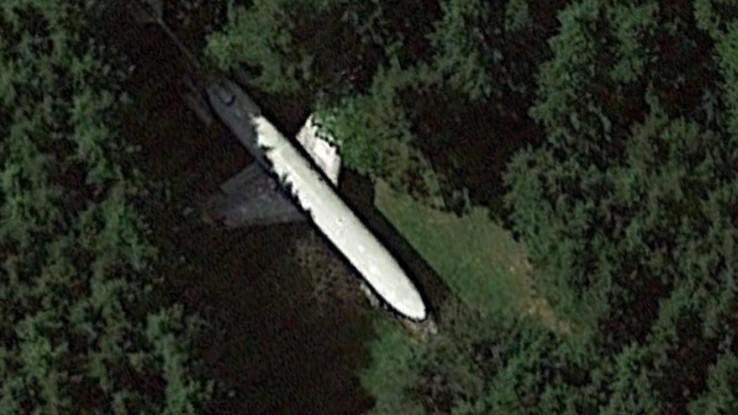
The home is owned by Bruce Campbell (sorry, not the famous Evil Dead actor), who purchased the plane for $100,000 back in 1999. Campbell belongs to the Aircraft Fleet Recycling Association, which looks to re-use old aircraft by turning them into homes or other unusual work or recreational spaces. With its unusual design, Campbell considers it a “great toy.”
One Great Guardian
Google Earth fans find themselves amazed over the beauty of the Badlands Guardian. Located in Alberta, Canada, the image appears to be that of an indigenous woman carved in profile. But the stone figure is actually just the result of water and wind erosion. When viewed from above, the Badlands Guardian appears convex but is actually concave.
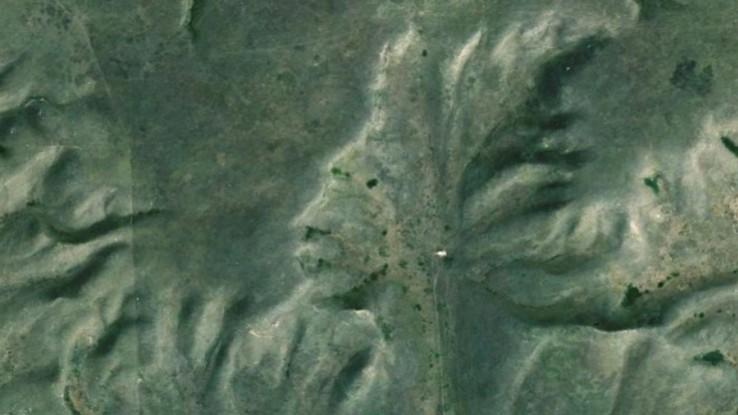
The feature was originally spotted on Google Earth by Lynn Hickox back in 2005. The Badlands Guardian has been called a “geological marvel” and was listed by Time Magazine as one of the top 10 images on Google Earth.
A Sweet Spot
If you like pineapple, you’ll surely enjoy the labyrinthine maze at Dole Plantation. Google Earth caught some sweet images of the pineapple plantation, which is also a popular Wahiawa, Hawaii, tourist attraction. According to Dole, the amazing maze is spread out over three acres.
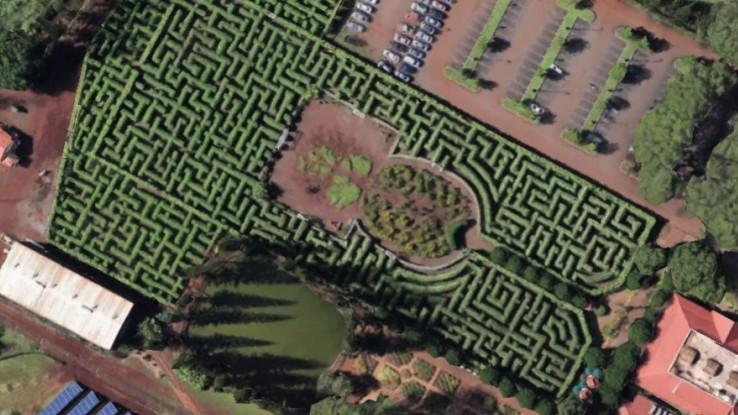
The spectacular spot boasts 2.5 miles of pathways created from 14,000 Hawaiian plants. The winding walkways lead visitors to secret stations that give clues on how to reach the center. In 2008, the Dole Plantation maze was declared the world’s largest labyrinth and is currently one of the only permanent botanical mazes in America.
A Musical Memorial
Rather than carve a traditional crop circle, farmer Pedro Ureta planted 7,000 cypress trees in memory of his wife, who died unexpectedly at the age of 25. The memorial guitar stretches over two-thirds of a mile and is created out of cypress trees and blue eucalyptus trees that highlight the guitar’s strings.
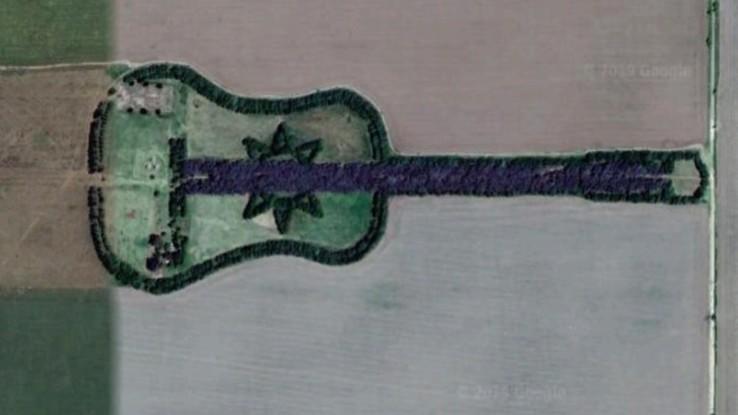
Ureta’s wife, Graciela, once suggested planting a unique design on their property. But during their brief marriage, they never found the time to implement the idea. Crushed by her unexpected death, Ureta designed and planted the guitar forest to honor Graciela’s love of the instrument.
A Creepy Castle
If you find yourself near Homestead, Florida, you might want to visit the mysterious Coral Castle. Seen on Google Maps, Coral Castle is more of a fortress. The bizarre structure was built around 1920 by Latvian immigrant Ed Leedskalnin for his former fiancee. The lovestruck Leedskalnin hoped the young woman would join him in the United States. She never did.
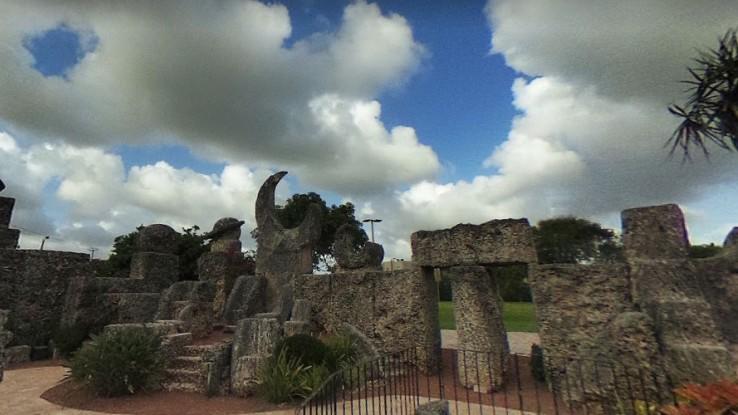
With many of the coral blocks weighing several tons, scientists aren’t exactly sure how the secretive Leedskalnin was able to build Coral Castle by himself. The bitter bachelor eventually turned Coral Castle into a local tourist attraction.
A Scary Scarecrow Crowd
At first glance, this photo on Google Maps may look like a group of zombies walking through an open field. But they’re merely a collection of not-so-scary scarecrows that were spotted in Kainuu, Finland. The scarecrow crowd was placed in the field back in 1994 as an art installation.
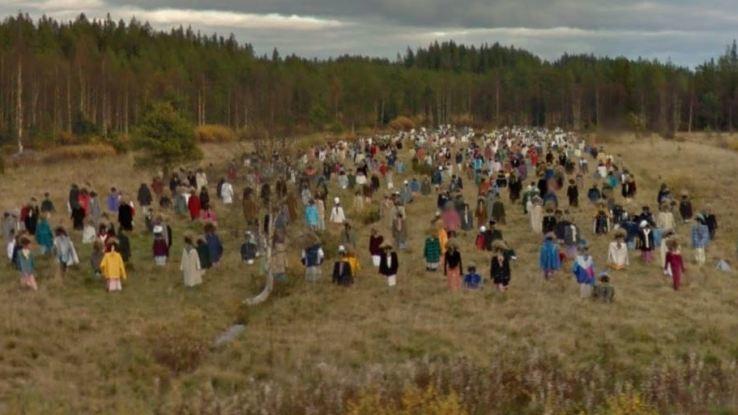
The scarecrows belong to artist Reijo Kela, who created nearly 1,000 figures. He called his artwork Silent People. Local villagers have become so fond of Silent People that they periodically fix up the scarecrows and change their clothing when items become worn.
Have a Heart
Google Earth fans can’t help but feel a bit romantic after spotting images of this heart-shaped pond in Columbia Station, Ohio. Nobody knows if there’s a story behind this precious pond other than that it’s man-made and located on private property with a white driveway encircling the lovely water feature.
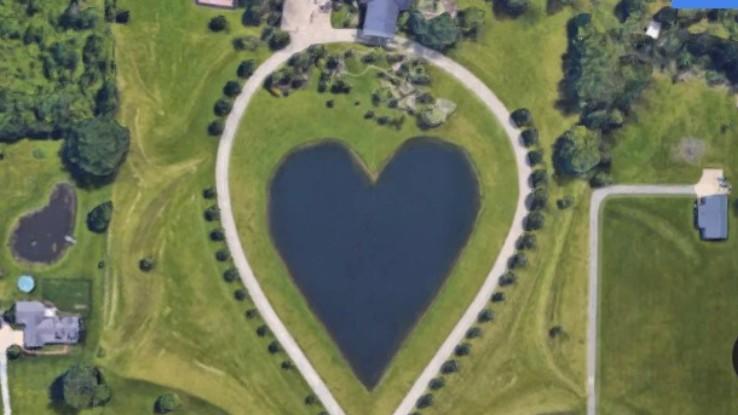
When the 30-acre home site was up for sale, it was described as having “lush landscaping with views of the heart-shaped pond in the front,” along with a lake in the back, in-law suite and gazebo. The heart-shaped pond is a popular image on social media during Valentine’s Day.
This Film Star Is Flying High
John Travolta is a famous actor, but he’s also an avid aviation fan. Google Earth spotted two of his planes sitting outside his Florida estate near Ocala. The large property has its own private runway and taxiway, with two buildings adjacent to the house designed to cover the planes.
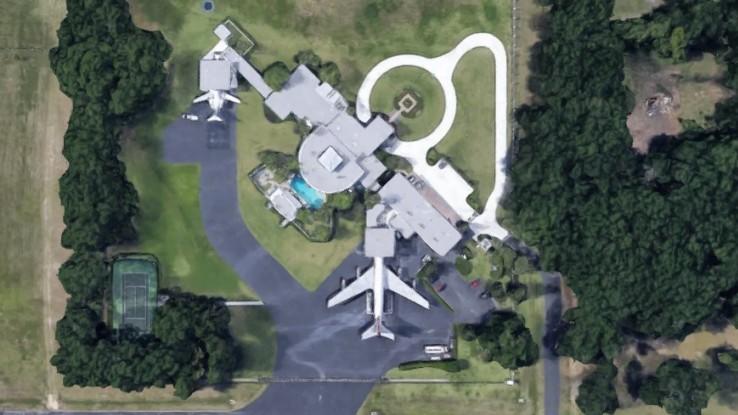
In 2007, Travolta was inducted into the Living Legends of Aviation, an association that recognizes achievements in flight. Travolta is so passionate about aviation that he wrote a book about flying and also served as a pilot when Oprah Winfrey traveled on a private flight to Australia.
Lion Around
While this icon may resemble something from The Lion King, it was actually created in 1933 to promote the Whipsnade Zoo in Bedfordshire. At 483 feet, it’s the largest hill design in England. The symbol is so big it had to be camouflaged during World War II to prevent German pilots from using it for navigation.
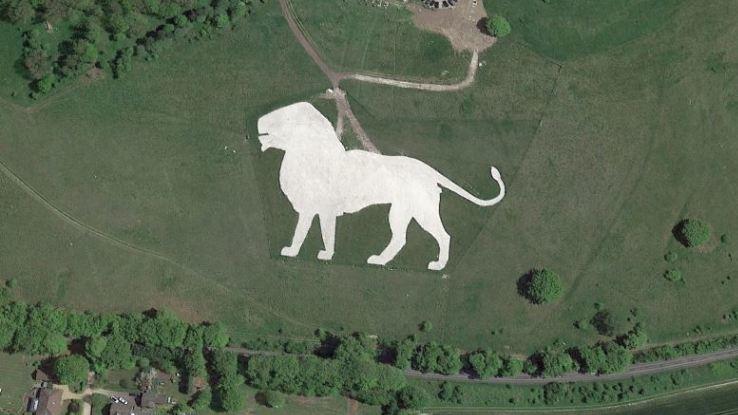
In 1981 the lion looked grand decked out with hundreds of light bulbs to celebrate the zoo’s 50th anniversary. But after decades of neglect and weed overgrowth, the icon got a makeover in 2018 when 800 tons of chalk were used in its renovation.
An Island of Terrifying Toys
Just south of Mexico City in the channels of Xochimilco is the Island of the Dolls. The island’s owner placed the terrifying toys in various spots back in the 1950s to ward off evil spirits. More than 50 years later, cobweb-covered dolls that are worn from weather and time still hang from trees and buildings.
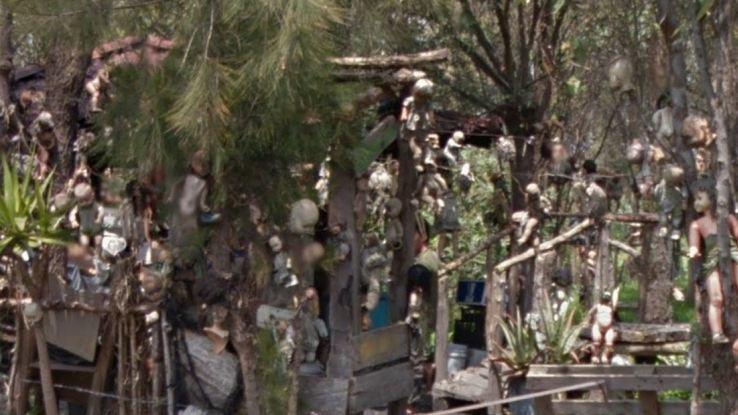
The dolls were meant to chase away the spirit of a girl who supposedly drowned years before. The Island of the Dolls is now both a tourist attraction and a religious spot where some go to leave offerings for the deteriorating toys.
A High School of Horrors
This photo from Google Maps appears to show a Cambodian high school. Tuol Svay Prey was a school just outside the capital of Phnom Penh, but the building was taken over by the violent Cambodian political faction, the Khmer Rouge, and transformed into a holding facility for political prisoners.
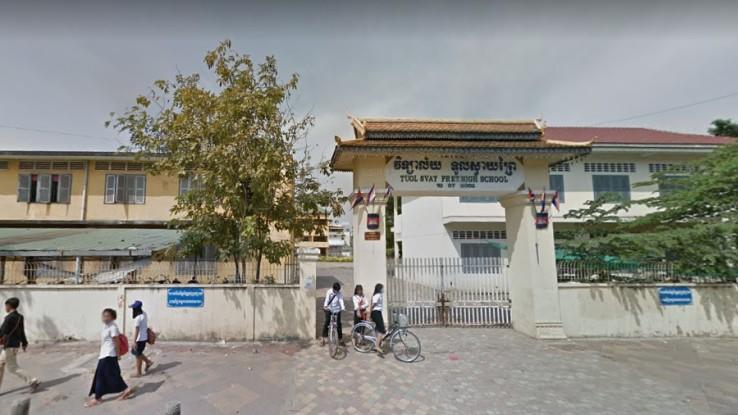
During the 1970s, the building was renamed “S-21.” Of the 14,000 people who were taken to S-21 as prisoners, only seven are known to have survived. Today S-21 is called Tuol Sleng Museum of Genocide and serves as a public memorial and education center to help prevent future atrocities.
The Pentagram
When folks saw this pentagram on images from Google Earth, they weren’t sure what was going on in Kazakhstan. The pentagram is often associated with witchcraft and satanic worship, leading some conspiracy theorists to speculate that something nefarious was afoot.
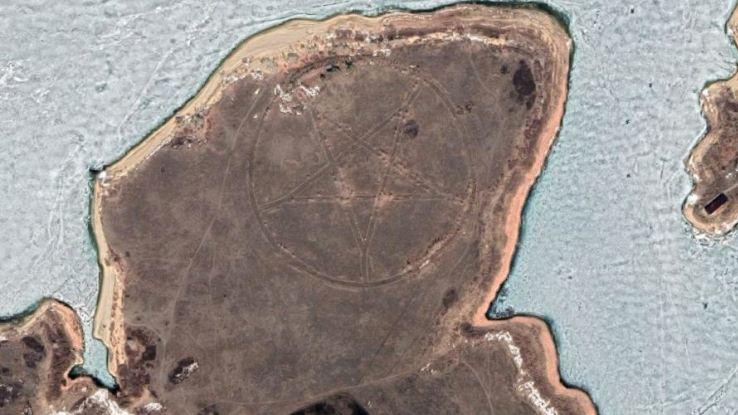
As it turns out, the symbol was more Soviet than satanic. The pentagram, which is 1,200 feet in diameter, was actually the outline of a star-shaped park and possible campground dating back to when Kazakhstan was part of the Soviet Union. During the Soviet era, stars were popular symbols used on flags, posters and buildings.
Superhero Parking Spot
Holy perfect parking spot! This building’s roof seems like it’s been reserved especially for the Batcopter. While it appears like the perfect helipad, no one’s caught a glimpse of the Caped Crusader just yet. The famed superhero probably thinks things are pretty safe at Kadena Air Base, an American outpost in Okinawa, Japan.
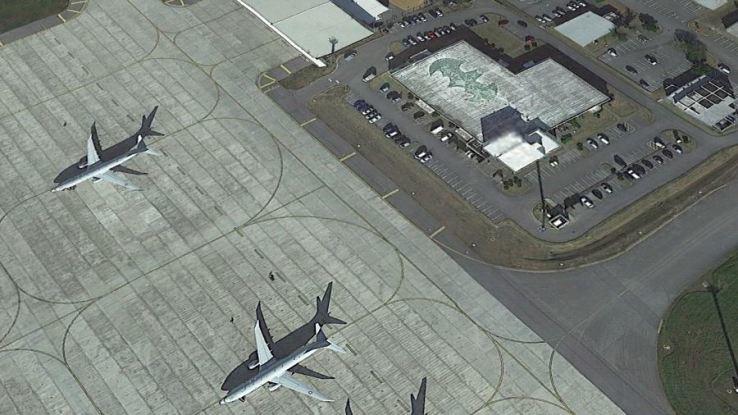
According to a Kadena Air Base spokesperson, the symbol was placed on the roof by the Air Force’s 44th Fighter Squadron, which calls itself the Vampire Bats. No one knows who painted the rooftop logo, but it’s believed to have been there since the 1980s.





